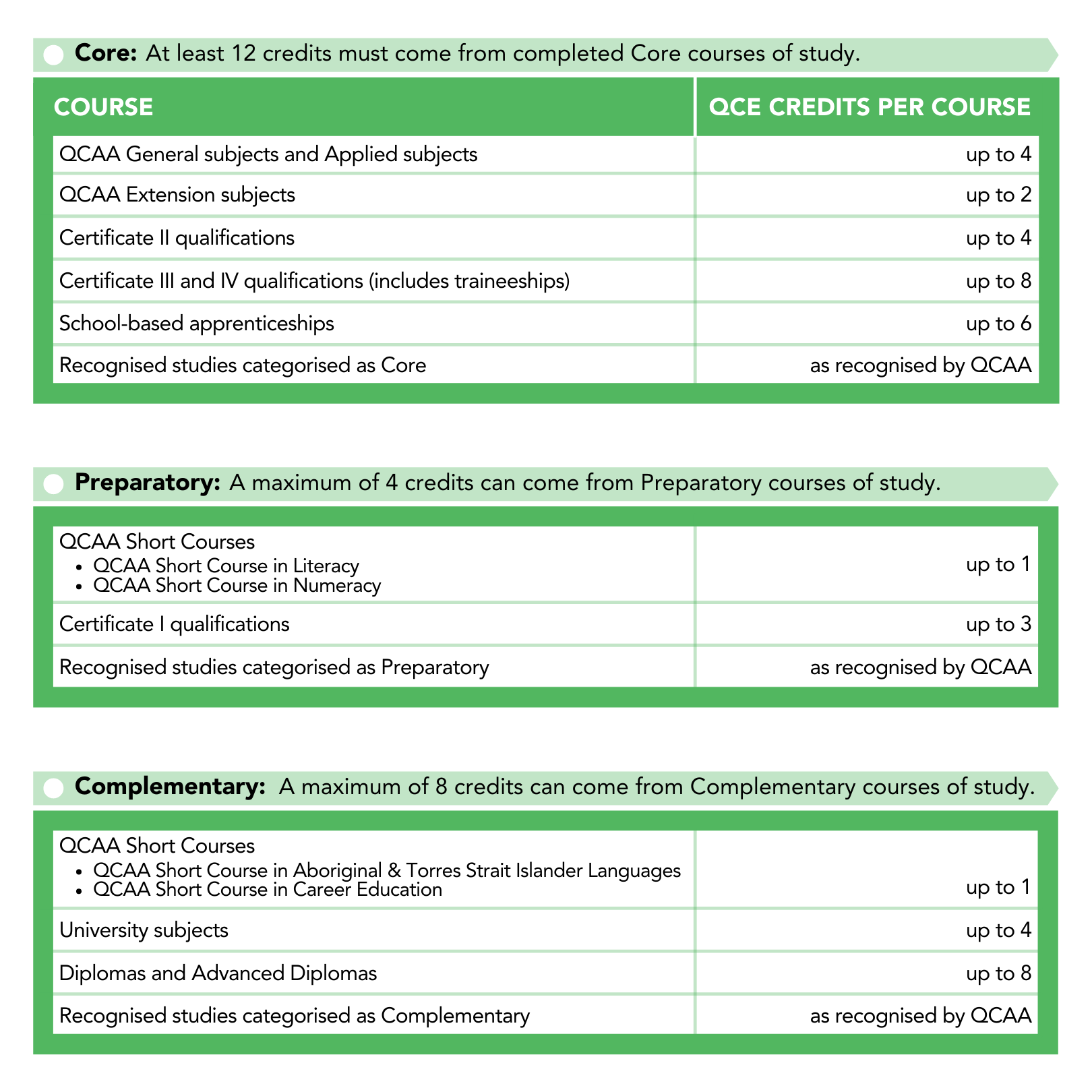Working towards a Queensland Certificate of Education (QCE) but unsure how many credit points you need? Worried about what subjects and courses to choose and whether they contribute to your QCE?
Well, look no further, as you’ve come to the right place! We’ll guide you through what QCE points are, how you can earn them, how many you need to receive an ATAR and everything else you need to know.
Keep reading to find out more about QCE points!
What are QCE points?
How do you accumulate QCE points?
How many QCE points are required to receive an ATAR?
What are QCE points?
To be awarded a Queensland Certificate of Education (QCE), students must earn at least 20 points through a combination of subjects, courses, or qualifications. Once a student has completed the set amount of learning at the set pattern and standard and meets literacy and numeracy requirements, they’ve achieved their QCE!
To fulfil the set amount for credit points, students can choose from the learning options of:
- QCAA subjects or courses
- Vocational education and training qualifications
- Non-Queensland studies
- Recognised studies
The credit points are further broken down into a set pattern where students must complete 12 credits of Core Courses as well as eight credits from any combination of:
- Core courses of study
- Preparatory courses of study (maximum 4)
- Complementary courses of study (maximum 8)
To achieve the set standard, students must have satisfactory completion, earning a grade of C or higher, competency or qualification completion, pass or equivalent.
How do you accumulate QCE points?
Completing the QCE is not simply a matter of just getting through your senior general subjects. Instead, different learning pathways earn different credit points, and students can choose from completing senior school subjects, vocational education and training, workplace and community learning, and even university subjects!
Accumulating credit points begins in Year 11, so it’s important to think carefully about which subjects are best suited to give you a successful result.
For General and Applied subjects, students receive one QCE point for each unit satisfactorily passed in Year 11 (Units 1 and 2), and two bundled QCE points for passing Units 3 and 4 at the end of Year 12.
QCAA General Subjects
General subjects are well-tailored to students preparing for tertiary education or vocational education, training, and work.
Not only do General subjects contribute up to four credits per subject towards the QCE, but they may also be compulsory for some university courses and contribute to an ATAR!
There are various subjects available, including:
- English
- General Mathematics
- Ancient history
- Biology
- Economics
- Legal Studies
This also includes Extension subjects, which award up to two credits per course.
General subjects are underpinned by the primary skillsets of literacy skills, numeracy skills and 21st century skills. 21st century skills refer to skills like critical thinking, collaboration and teamwork, and ICT skills, that help students to find success in their work environments and personal life!
Struggling with how hard the start of Year 11 for the QCE? There’s a specific reason why which you need to understand!
QCAA Applied subjects
Applied subjects prepare students with practical skills that lead to further education, vocational training, or work.
As with General subjects, Applied subjects may contribute up to four credits per towards the QCE. However, only one Applied subject contributes to an ATAR when combined with four General subjects.
A few of the subjects available include:
- Essential English
- Business Studies
- Industrial Technology Skills
- Hospitality Practices
- Tourism
As well as transferring literacy skills and numeracy skills, Applied subjects are underpinned by applied learning, community connections and core skills for work. Applied learning refers to the understanding and applying of knowledge and skills in real-world contexts.
Community connections focus on connecting classroom experiences with real-world interactions to build awareness of life beyond school. Core skills for work include the knowledge, understanding and non-technical skills important for successful participation in work.
QCAA Short Courses
Short courses are a great choice for students interested in pursuing vocational education, training, and employment. Short courses may contribute one credit towards a QCE, but they do not contribute to an ATAR.
There are four Short Courses to choose from:
- Literacy
- Career Education
- Numeracy
- Aboriginal & Torres Strait Islander Languages
Each Short Course involves notional teaching, learning and assessment time of 55 hours.
Vocational Education and Training (VET)
With approximately 60% of Queensland senior students achieving VET qualifications, VET courses are a popular choice for students looking to learn practical workplace skills during high school.
Certificate II qualifications contribute up to four credits per course towards a QCE, while Certificate III and IV qualifications (includes traineeships) contribute up to eight credits! Additionally, one VET at Certificate III or above may also contribute to an ATAR.
There are hundreds of different occupations that a student can study through VET courses, with the most popular courses including:
- Business
- Information and communication technology
- Hospitality
- Construction
- Fitness
- Sport and recreation
Other courses
While this may sound vague, Other courses simply refer to recognised certificates and awards or university subjects studied during school that allows students to pursue their areas of interest. This includes some Non-Queensland studies, such as the International Baccalaureate and some interstate courses.
Depending on the course, QCE credit and ATAR eligibility vary. There is a range of different eligible courses spanning topics of Business, Citizenship, Languages, Science, Technologies, The Arts and more.
A few of the courses on offer include:
- The Duke of Edinburgh’s International Award – Australia, Queensland
- HSK Chinese Language Proficiency Course and Test — Confucius Institute, University of Queensland
- Children’s Health, Queensland Hospital and Health Services – Good Start Program: Health Promotion for Maori and Pacific Islander Communities
- QMEA Science Maths and Related Technologies for Engineering and Electrical School-based Apprentices
- Queensland Ballet Academy – Academy Program
- Associated Board of the Royal Schools of Music (ABRSM)
How many QCE points are required to receive an ATAR?
While the QCE is a qualification based on successfully completing a combination of subjects and courses worth a minimum of 20 credits, the ATAR is a national rank used for university admission.
In QLD, the ATAR is calculated based on your best five scaled subject results. As such, it’s a good idea to study six subjects during Years 11 and 12 to provide you with a backup option. These results can come from:
- best five General subject results, or
- best results in four General subjects, plus one Applied subject, or
- best results in four General subjects, plus one VET qualification at Certificate III or above.
Students must successfully complete an English subject to be eligible for an ATAR. However, the result will not be a mandatory inclusion in your ATAR calculation if it’s not your best-scaled subject.
You don’t need to do six full subjects to get your 20 QCE points! Instead, consider dropping a subject in Year 12 to reduce your stress levels!
On the hunt for other QCE resources?
Check out some of our other articles related to the QCE below:
- Everything You Need to Know About the QCE and ATAR
- The Essential Guide to Applying for University Through QTAC
- QCE Year 11: How to Effectively Prepare for Your IA Exam Block
- The Ultimate List of QCAA Cognitive Verbs That You Need To Know
- What You Should Consider When Selecting Your QCE Subjects
- How to Stay Motivated Throughout the Year During the QCE and Avoid Burnout
- The Top ATAR Affordable Schools in the Brisbane Region
- Is Year 11 Different to Year 12 for the QCE?
- How to Write Effective Study Notes for Social Science Subjects
Are you looking for some extra help with understanding QCE points?
We have an incredible team of QCE tutors and mentors!
We can help you master your QCE subjects and ace your upcoming QCE assessments with personalised lessons conducted one-on-one in your home or online!
We think it’s important to offer high quality services to regional towns. We have expert tutors and mentors across the coast, up to Townsville! Get paired today!
We’ve supported over 8,000 students over the last 11 years, and on average our students score mark improvements of over 20%!
Looking for tutoring support on the Gold Coast? Get paired with one of our awesome tutors today!
To find out more and get started with an inspirational QCE tutor and mentor, get in touch today or give us a ring on 1300 267 888!
Ashley Sullivan is a Content Writer for Art of Smart Education and is currently undertaking a double degree in Communications (Journalism) and a Bachelor of Laws at UTS. Ashley’s articles have been published in The Comma and Central News. She is a film, fashion and fiction enthusiast who enjoys learning about philosophy, psychology and unsolved mysteries in her spare time.





